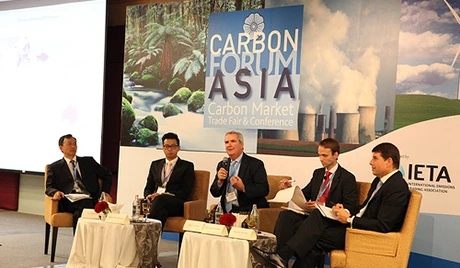Photo courtesy: Priya.Balraju1/Flickr
Many people have voiced pessimism over an international agreement to address climate change since the 2009 climate conference in Copenhagen fell short of expectations. The lack of a comprehensive, global effort to curb emissions; the failure by the United States to pass meaningful federal legislation, the continued recession in Europe; and, most recently, the election results in Australia have undermined efforts to put a price on carbon and dampened hope for market-based solutions to climate change.
The somber mood was evident at the Carbon Forum Asia, held in Bangkok between September 24 – 27. But participants at the event also found a glimmer of hope.
New markets, new instruments on the horizon
The development of two provincial emission trading systems and five city pilots in China is considered by many to be the most significant development in recent years for reviving carbon markets. Efforts by the World Bank-led Partnership for Market Readiness to design and pilot market instruments in 16 developing and middle-income countries were also cited as proof that the idea of using pricing to rein in greenhouse gas emissions is far from dead.
Trading of energy certificates in India, the development of tradable credits from recycling of packaging materials in Brazil, and using renewable energy certificates to meet renewable portfolio standards are all examples of emerging market instruments.
However, the absence of an international agreement, along with the proliferation of domestic national and sub-national initiatives, have created a fragmented and heterogeneous carbon market that is often driven by national politics, priorities and by sectoral objectives.
Participants of Carbon Forum Asia were exploring the complexity of connecting these fragmented and heterogeneous markets, spending an entire day at a workshop titled "Linking Emission Trading Schemes - A Prospect on future Carbon Market in Asia and the Pacific."
By connecting these markets we can build liquidity and efficiencies associated with deep markets.
The original model of carbon markets – which channeled resources to developing and middle-income countries in return for lower cost of compliance to greenhouse gas reduction commitments in Europe or Japan or Australia – has changed quickly. As the initial gold rush of the carbon market comes to an end, events such as Carbon Forums show that the world is starting to think about the next generation of markets.
Those of us who remain truly committed to the concept of market-based solutions to climate change will help these markets evolve and mature. One proposal by the World Bank’s Task Force to Catalyze Climate Action was described by Shell’s David Hone following the Carbon Forum North America conference held October 1 – 2 in Washington, D.C.



Join the Conversation